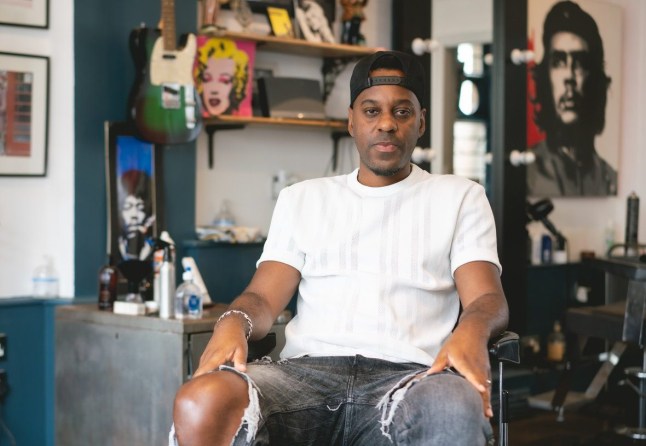
Standing in front of the permanent secretary and a roomful of executives, I nervously cleared my throat.
It was October 2018 and I was in the middle of giving a big presentation on progressing racial equality in the department, but instead, I anxiously excused myself saying: ‘I have to go do the nursery run.’
No one leaves those kinds of meetings early. But, as I was due to be talking just before the exact time that I had to leave, I had no choice.
Though none of the executives expressed any disappointment or frustration at my sudden departure – probably helped by the fact that I was a middle manager at the time – they were quite clearly surprised and I felt bad for bailing.
Deep down I knew I’d done everything in my power to avoid this awkwardness: I’d told my PA I needed to leave at 3pm to pick up my daughter from nursery days earlier, so it wasn’t my fault that the message hadn’t been passed on.
Still, I couldn’t help but think about other dads in my position. What if they weren’t as privileged as I was? What if their employer wasn’t as understanding?
That’s when it hit me. We never use the phrase ‘working dads’ like we do ‘working mums’, but we really should.
That way we can help men to thrive in their careers and allow them to be the caring fathers that they want to be.
When my wife and I learned we were to become parents in January 2015, we were absolutely over the moon.
However, like a lot of expectant parents, we were also naïve about how having a child was going to change our lives. I had no idea just how much the responsibility for another human life would impact my decision making, priorities and freedoms.
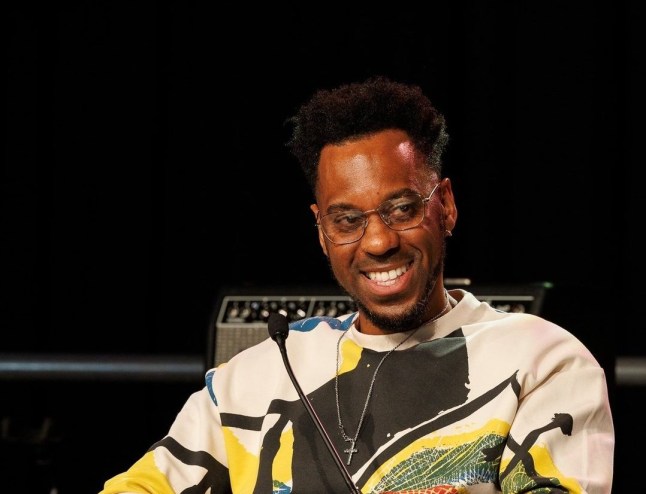
I became so much more aware of my surroundings and started to care more about the environment. I started picking up litter on our street and would notice if a car was driving too fast down our road. And then there’s life’s small pleasures. like having time to cook a nice meal or going to the barber’s to get a haircut; they suddenly seemed like massive tasks.
That said, the one conversation we made sure to have before our daughter was born was about how we were going to share the childcare responsibilities equally.
We talked about how we were going to split up the nursery drop-offs and pick-ups equally between us and how we could work our careers around it. We also discussed how we’d both be responsible for the bath and bedtime routines and would juggle the many soft play dates and birthday parties at weekends with date nights.
Had we not talked about those sorts of specifics from the start, I firmly believe that it could have led to confusion and resentment down the line.
I say that because, unequal division of childcare and household duties is part of the reason divorce rates are so high.
According to research conducted by the Government Equalities Office, when mothers are primarily responsible for childcare the risk of relationship breakdown increases by 46%, compared to couples where partners hold equal childcare responsibilities.
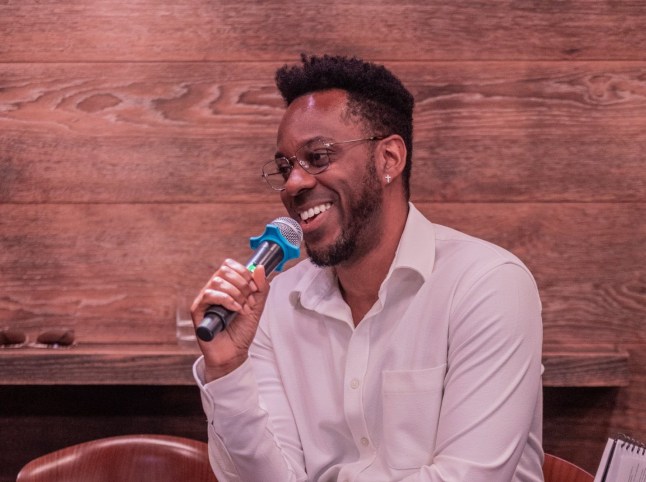
That’s not to say that everyone needs to share care – you should do what works for you – but having the conversation about what you both want is important.
For us, the reality of parenting was challenging from the beginning as our daughter was born with an infection called Group B Strep, meaning she wasn’t breathing properly and had to be rushed to the ICU.
It was undoubtedly the biggest traumatic event in our lives and, though we’re all fine now, it meant we struggled in the early months.
Personally, I was left with PTSD that manifested in feeling anxious in work meetings, being in tears on the train on the way home and insomnia for months on end.
Thankfully, I had an empathetic line manager who allowed me to work flexibly so I could manage my mental health and be around for my family.
I had different arrangements: working compressed hours with Fridays off, later start times or working one day per week from home (which was a rare privilege in the pre-pandemic world) was fundamental in allowing me to share the load as much as possible.
It meant I could be home for the night-time feeds, or could take my daughter to playgroup or do the nursery run as she got older. This also meant I truly bonded with her and I learned how to parent her properly. As a result our relationship has always been incredibly special and still is to this very day.
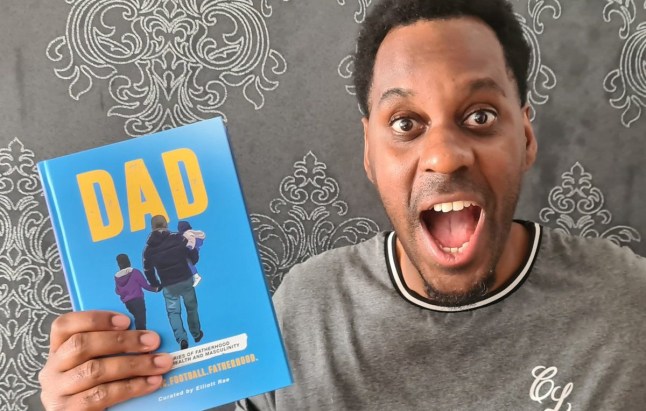
When my wife returned to her job after a year, it became routine to sit down together on Sundays with our calendar so that we could plot the week ahead. Because although we had a baseline schedule to work with, no two weeks were the same.
Sometimes I had to travel for work or my wife had an important presentation, so we were flexible with each other. It also really helped to have the support of both grandparents and our employers.
So why, therefore, did I feel a mixture of awkwardness and embarrassment at having to excuse myself from that meeting in 2018 to do the nursery run? Why did I leave work worried that it’d have a negative impact on my prospects and reputation at work?
The simple answer is, we don’t talk about dads having that kind of parental responsibility in the same way we do for mums.
Don’t get me wrong, life is not all hunky dory for mothers either. In fact it’s even harder.
It’s still generally assumed that parental responsibilities will fall to the mother, which contributes to the fact that 54,000 mothers per year will lose their jobs due to maternity discrimination.

Let’s not also forget that 80% of the gender pay gap is attributed to the motherhood penalty – aka the detrimental impact having a baby can have on a mother’s career, pay, likelihood to get a promotion and the ability to gain good quality employment.
But for us to support mothers to thrive in the workplace, we really need to support fathers to thrive at home, too.
We’ve used the term ‘working mum’ for generations but the term ‘working dad’ still seems somewhat alien. And as we know that language shapes culture and helps define how we think, it’s a shame to see that how we speak about working parents hasn’t evolved sufficiently to keep up with the times.
Men are also now doing more of their share of childcare (and rightly so) but that means many dads have similar or the same caring responsibilities – be that school drop offs, assemblies or sports days – outside of work as mums.
But not enough dads have employer support to be equal parents.
While more and more organisations are introducing equal parental or shared parental leave, the vast majority of employers still only offer the statutory two weeks of paternity leave. We also know that men in the UK are less likely to ask for flexible working, and when they do they are less likely to have those flexible working requests approved.
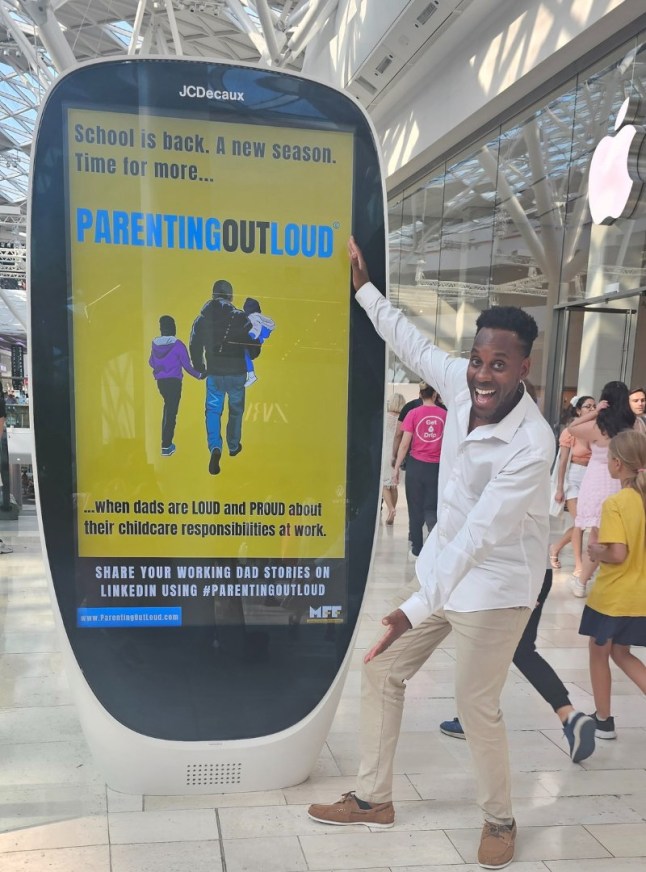
As a result, one in three dads do not feel comfortable speaking about their childcare responsibilities at work.
That’s why I launched Parenting Out Loud in April, an initiative to empower working dads from the very start of their child’s life.
Named after a term I started using back in 2021 during my own talks with my employers, my business’s sole focus is to help other companies to create workplace cultures where dads feel comfortable to literally parent out loud.
To me that looks like putting nursery pick-ups in an open calendar, leaving the office loudly, or declining/rescheduling meetings around child care responsibilities. And luckily, it seems to be catching on.
Through keynotes, workshops, leadership roundtables, men’s listening sessions, and, more recently, a new billboard campaign – which was supported by out-of-home agency Talon – we’re gradually seeing that ‘parenting out loud’ is becoming part of the normal vernacular in workplaces, with dads and amongst Diversity, Equity and Inclusion practitioners and that really is the key.
My daughter is nine now, but I know that there are still many dads (and mums) who are afraid of what colleagues might think of them, or even fearful for their careers, if they leave meetings early for the nursery pick up.
I want to empower them to be loud, proud and transparent in the workplace when it comes to their childcare responsibilities. Giving them the chance to be truly equal parents will only make things better for them, for the child, for mums and for gender equality in the whole of society.
So let’s make the phrase ‘working dads’ as normalised as ‘working mums’ is – then every parent wins.
Do you have a story you’d like to share? Get in touch by emailing Ross.Mccafferty@metro.co.uk.
Share your views in the comments below.
MORE: I asked to work from home for my health – I was fired
MORE: I looked in my wardrobe and was completely disgusted
MORE: Alpha Male domination is the theme of 2025 — men like Trump mean ‘nobody feels safe’














